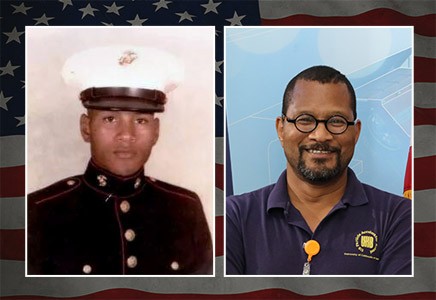Ken Surles-Law served as a Combat Engineer in the Marines from 1977 to 1982. He started his career at Jefferson Lab in 1995 and now works as a CEBAF Accelerator Crew Chief.
"The Marine Corp prides itself on developing leaders," said Surles-Law. "That self-confidence convinced me that I could study math and physics and do anything I set my mind to do..."
Q&A with Ken Surles-Law, U.S. Marines
What did I do in the military?
I was attached to the combat engineering unit. My primary responsibility was water purification. We converted pond water into drinking water during field exercises.
What made me decide to join the military?
I graduated from high school a year early and felt uncomfortable on a college campus. I attended Prince Georges Community College but felt out of place. I met a Marine Corp recruiter that told me I would feel comfortable in a set of Marine Corp dress blues. I fell for it, joined, went to Parris Island, South Carolina for boot camp and the rest is history. If I had to do it all over again I would not change a thing.
Why I choose the Marine Corp?
Initially I signed up for the Navy. My older brother also signed up for the Navy. We were both slated to go to boot camp around the same time. At the last moment, I changed my mind and signed up for the Marines with encouragement from a Marine Corp recruiter with a good sales pitch! He promised me I would look good in a set of dress blues!
What was my favorite part of the job?
I enjoyed being out in the field and going on cruises. Of course, these cruises were not your typical Disney Cruises. I got the opportunity to do a few NATO cruises and work alongside the British, German, Danish, Scottish and other NATO forces. The camaraderie and competition between the various countries Marines and soldiers was impressive. In short, traveling, meeting new friends, exploring new cultures was by far the highlights of my time in service.
What was my most interesting/favorite deployment or duty station?
If I had to choose, I would pick my time in Okinawa, Japan. When I got orders to Japan, I was assigned to a Facilities Maintenance position. No cruises, no traveling, but maintaining the base at Camp Courtney and Camp McTureous. I got the opportunity to become immersed in the Japanese culture. The Japanese civilians I worked alongside with were very friendly. Got many invites to homes, to hang out with their friends, and they all accepted me as a friend. I think we broke down stereotypes on both sides and that taught me the power of listening and understanding others through relationships.
What skills did I develop that I use now after my military career?
The greatest lesson I received from the Marine Corp was courage, bravery, and self-confidence. I was (still am to a degree) a skinny, shy kid that would not speak up for what I believed in. The Marine Corp had enough confidence in this skinny, shy, 17 year old to put in leadership positions. They wanted to hear what I had to say. They actually listened. The Marine Corp prides itself on developing leaders. The old saying "I sent you a boy and you returned a man" rang true for me. That self-confidence convinced me that I could study math and physics and do anything I set my mind to do as well as to speak up even if the crowd is not on my side. That's not the same as arrogance, because the other thing the Marine Corp lets you know from the very beginning is that you know absolutely nothing so we got lessons in everything. In short, the greatest skill that I've learned as a Marine is to be confident in who you are and always be prepared to learn.
The regional home of Jefferson Lab, Hampton Roads, has a rich military history. Located in Southeastern Virginia, the region is currently home to more than 80,000 men and women in uniform, representing every branch of the armed forces. Throughout November 2018, Jefferson Lab is celebrating the region's military ties by highlighting some of our veteran employees who have served in the armed forces and who continue to serve their nation by supporting the research efforts carried out at the laboratory.


